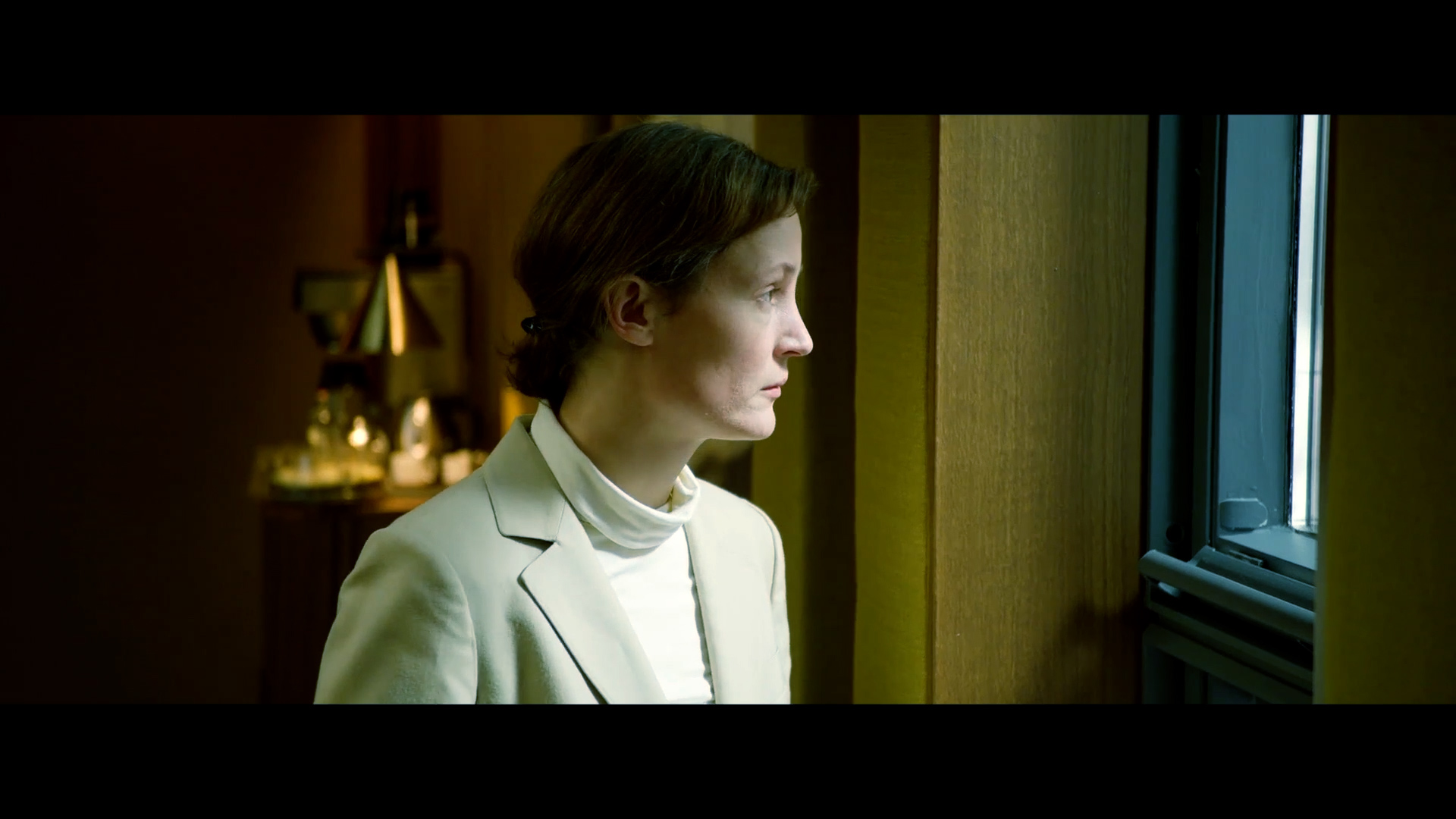Re-Creation
Re-Creation
VERDICT: This gripping, formally inventive jury-room drama is part speculative fiction and part true crime exposé built around strong performances
A real life murder investigation underpins the speculative docudrama of Re-Creation.
On 23 December 1996, Sophie Toscan du Plantier was killed near her holiday home in County Cork, Ireland. The prime suspect quickly became Ian Bailey who twice arrested by the Garda but never charged as it was determined that there was not sufficient evidence to convict. In 2019, the Cour d’Assises in Paris tried Bailey in absentia and convicted him to 25 years in prison, though Ireland did not allow extradition. David Merriman and Jim Sheridan’s exceptional drama, Re-Creation, imagines what might have happened if a contemporary Ireland had decided to bring together a jury to revisit the case.
The vast majority of the film takes place in one room – the jury deliberation room – where a group of Irish people peppered with a handful of fellow Europeans are charged with deciding the fate of Ian Bailey (played, silently, by Colm Meaney). Merriman and Sheridan use the framework of Sidney Lumet’s 12 Angry Men for this exploration of the case, with the jury all beginning fairly convinced of Bailey’s guilt except for Juror #8 (Vicky Krieps rather than Henry Fonda) who feels enough doubt to challenge the prevailing narrative.
Rather than the classically mounted drama of Lumet’s film, Re-Creation uses its structure to create something fresh, intimate and alive. Merriman and Sheridan have been working on a documentary about this subject for some years but in this context find a way to bring significant emotional heft to the conversation, opening up questions about the biases we old hold and how they might easily inform public opinion about such a notorious case. In this dynamic setting, they are able to fuse real world documentary evidence they have obtained or even uncovered themselves, with archival materials from the media coverage of the investigation and a gripping dramatic conversation about the case.
The main jury conversation was shot over just 11 days as evidence was revisited and the collation of votes ebbed and flowed. Shot in crisp mediums shots and close-ups, Carlo Thiel’s cinematography keeps things quite claustrophobic, helping the pressure in the room to build. There are a couple of sequences take the jurors outside the confines of their room – on a trip to visit the scene of the murder, and to a lunch break that allows a brief respite – but the film is at its most enthralling when they’re conversation, building to a bravura séance-like scene towards the end that seems to conjure something spectral. Vitally, the directors came to the decision for Sheridan himself to play Juror #1, meaning that he is able to help the room navigate through the facts and counter-facts and to push the actors from within the frame in a process that leant heavily into improvisation. While the bones of the plot – for want of a better word – are taken from the directors’ script, several of the actors drew upon their own lives and histories as their juror characters wrestled with their opinion on Bailey’s guilt. This is most powerfully the case for John Connors who is absolutely exceptional as Juror #3, the Lee J. Cobb role, diametrically opposed to Krieps’ who is herself fantastic as Juror #8.
Connors begins by vehemently condemning Bailey, citing his past history of abuse, his generally unlikely demeanour and the avalanche of evidence indicating his guilt. For Juror #3, deliberation is pointless and the final decision a foregone conclusion. Unlike 12 Angry Men, Re-Creation is working with a real case that audiences – particularly in Ireland – might be familiar with, and so Juror #3’s position does not feel so unreasonable. However, over the course of the conversation his motivations become ever more apparent, his contradictions are exposed and, ultimately, an astonishingly performed revelation becomes the emotional crux of the entire film. Connors is effectively playing opposite Krieps and it is entirely to his credit that he completely steals the show from one of the most consistently impressive actors working in film today. It’s a powerhouse performance that warrants wider acclaim than it is currently getting.
If the jurors and their ongoing battles of conscience pack the film’s emotional punch, then the intricacies of the conversation and the presentation of the evidence, pack its intellectual one. Over the course of their deliberations, the jurors probe – in the way Merriman and Sheridan might have in a documentary – the imprecisions of the case against Bailey. Doing this through drama allows each of the disclosures of misinterpretation, of obfuscation, of evident tampering to have its own weight as it effects the characters on screen. Quite besides the specifics of the Bailey trial, it is a potent reminder of how our predispositions effect our judgement. In the case of both Sophie Toscan du Plantier and Ian Bailey (who died in 2024) it is a reminder that justice can only be served by uncovering the truth, not massaging it to suit our beliefs.
Directors, screenplay: David Merriman, Jim Sheridan
Cast: Vicky Krieps, John Connors, Jim Sheridan, Aidan Gillen, Colm Meaney
Producers: Fabrizio Maltese, Tina O’Reilly
Cinematography: Carlo Thiel
Editing: Jack Thornton
Music: Anna Rice
Sound: Carlo Thoss
Production design: Christina Schaffer
Costume design: Magdalena Labuz
Production companies: Hell’s Kitchen Films (Ireland), Joli Rideau Media (Luxembourg)
Venue: Oldenburg Film Festival (International)
In English, French
89 minutes


